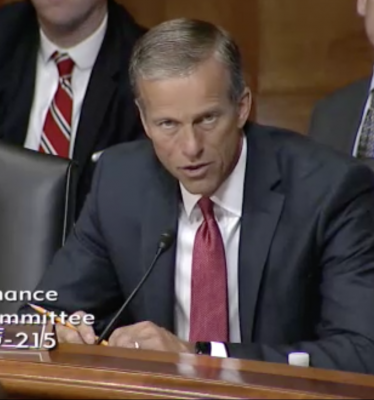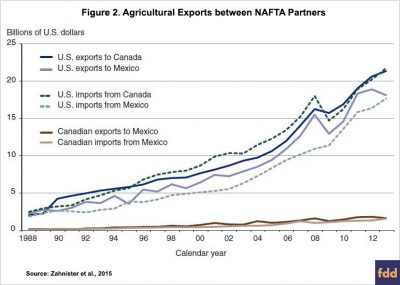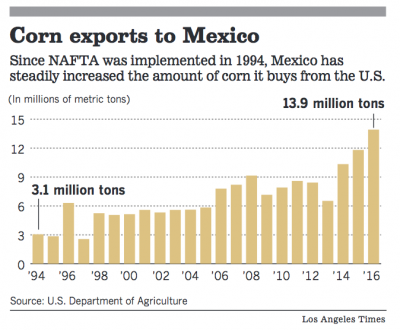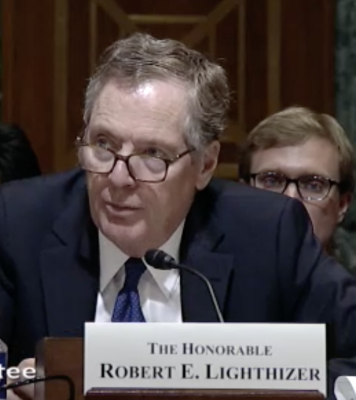A prolonged military conflict in the Middle East could potentially upend key commodity markets due to Iran’s control of the Strait of Hormuz, one of the world’s most important trade…
Farm State Senators to USTR: On NAFTA, “Do No Harm.”
The Senate Finance Committee held a hearing yesterday to examine the administration’s approach to trade policy, and heard testimony from U.S. Trade Representative Robert Lighthizer. Farm state lawmakers expressed concern regarding agriculture and NAFTA renegotiation, admonishing the executive branch to “do no harm” with respect to gains in agricultural trade that have resulted from the agreement. Timelines for the renegotiations were also discussed, as well as agricultural trade issues with China. Potential future bilateral trade negotiations were also mentioned.
Background
In his opening statement yesterday, Ambassador Lighthizer noted that, “We at USTR are committed to enhancing U.S. food and agricultural exports globally. Secretary Perdue and I will be working closely together to ensure that we are effective in achieving this goal. Thus far, USTR has made progress with respect to China, Argentina, and Vietnam, in addition to the ongoing work that USDA and USTR staff undertake every day to promote U.S. agriculture. We raised our concerns with Canadian officials and at the WTO on Canada’s dairy pricing policy, and I engaged Vietnam to address concerns affecting U.S. exports of offal and use of certain veterinary drugs in beef and pork. I am moving forward with dispute resolution on China’s trade-distorting farm support for corn, wheat and rice with a panel formed and dispute proceedings ongoing.”
NAFTA Issues
Senate Agriculture Committee member John Thune (R., S.D.) indicated yesterday at the Finance Committee hearing that, “I think it’s fair to say that most of us here, for most of us, at least, the top issue in the trade space is the administration’s efforts to renegotiate NAFTA. And I happen to believe NAFTA has been an important and beneficial trade agreement for the United States. I agree with the President’s objective, however, of reviewing and modernizing the agreement.
And that said, I would ask you to proceed with caution, especially with regard to the agricultural provisions which are extremely important and have been very successful for farmers and ranchers in states like South Dakota.
“And while there’s always room for improvement, I’d ask you to start with a policy of do no harm. And we will be getting in touch with you on this and other aspects of NAFTA before the negotiations begin, a number of us who are very seriously interested in engaging on that subject, and we’ll invite some of our colleagues on the Democrat side in those efforts as well.”

“NAFTA has done a tremendous amount of good for South Dakota’s farmers. It’s frankly quite difficult to overstate its importance to our agriculture sector. But any agreement that’s over two decades old can certainly stand to be examined for areas to improve it. And I think the best place to start with that should be plugging the holes that we’ve overlooked the first time around and then upgrading the trade rules to match the situation that we’re dealing with today,” Sen. Thune said.

Sen. Thune added that, “And one example would be South Dakota’s dairy industry where, you know, you have one of the few sectors that still faces exorbitant Canadian tariffs as well as non-tariff policies that are distorting trade. Canadian Class 6 and 7 pricing programs have created a lot of concern about how they are affecting not just U.S. export opportunities to Canada, but also U.S. dairy exports to third country markets.
“And just as it’s incumbent upon the United States to play by the rules and hold up our end of the bargain, it’s essential that other countries do the same. So can you assure me that these non-tariff and tariff concerns limiting the sales opportunities of South Dakota’s dairy industry will be addressed in the coming NAFTA negotiations?”
Amb. Lighthizer noted that, “Yes, sir, I’m very familiar with them. A number of senators have raised it, and it’s very—and industry sources—and it’s very important, and it is something we’ve talked about somewhat already with the Canadians, and certainly expect to deal with further.”
Iowa GOP Senator Chuck Grassley, who also serves on the Ag Committee, noted at yesterday’s Finance Committee hearing that, “I know you didn’t come here for praise, and I don’t really praise you, but I think there is some calm because of your appointment compared to the fear of protectionism that was out there late last year and early this year, so I think that when it comes to NAFTA, particularly, and some people in the administration taking the view that first do no harm, I think that that’s a wise approach, and somewhat calming.
“NAFTA is very important for my state because Mexico imports, No. 1 importer of our corn, and No. 2 for soybeans. So what can you say to give my Iowa farmers and also our manufacturers peace of mind that these trade negotiations or renegotiations are not going to be overly disruptive of their businesses?”

Amb. Lighthizer responded by saying, “Well, I can say what I said before, Senator, and that is that, I mean, it’s very important that when you modernize—our objective is to modernize. Our objective is to incorporate the ideas of this committee and to get our trade deficit down, particularly with respect to Mexico. We realize they’re a huge agricultural market. Anything that they would do that would reduce agricultural sales would make the trade deficit worse, not better. And in our opinion that’s clearly not our objective.
“I’ve met a lot with farmers, a lot with agriculture groups and food processing groups. It’s very important, and I think…it’s very important that we not move backwards on that, and we in fact look for openings for additional access, and certainly both of our trading partners are aware that that’s our position.”

Amb. Lighthizer added that, “So all I can say is that I’ve assured you and I’ve assured Senator Roberts and many, many other members that we’re going to do everything we can to improve upon the agricultural situation, particularly with respect to Mexico, agricultural sales particularly with respect to Mexico, and we’re not going to tolerate anything that moves backwards. That’s not the intention of this group. It’s clearly not the President’s idea.
So we have a whole lot of very important things we can do in this agreement that will make a better agreement for all of our workers, farmers and ranchers, including, we expect, to hold onto what we have in terms of agricultural sales.
And Ag Committee Chairman Pat Roberts (R., Kans.) indicated yesterday that, “I want to point out the work you have done in the past two months has made it clear you are the administration’s leader on international trade, and I thank you for that, and for spreading the message and educating your colleagues and international counterparts about the important role that trade plays in the U.S. ag economy.
“Thanks also for your selection of Greg Doud to be your lead negotiator. He’s a good man. And Mr. Chairman, I would hope that we could expedite his consideration with regards to his confirmation.
I had the privilege last week to speak at the agriculture symposium held by the Federal Reserve Bank of Kansas City. That’s right in the heart of farm country. We discussed the severity of the current state of the ag economy. It is clear we are in the middle of a very rough patch. I hope it is not prolonged, but that seems to be the case. The outlook will not improve unless we have a determined effort on trade.
Chairman Roberts also stated that, “And I’ll just say it wasn’t too long ago people noted the comments made by the President when he was campaigning, and, for that matter, the candidate that he opposed, Secretary Clinton, and both opposed TPP, and both had some pretty strong statements about NAFTA. I don’t think NAFTA should be a target. I think it should be an opportunity. I note that the verbs have changed. It isn’t ‘kill’ or ‘terminate.’ It has gone to ‘modernization, strengthen, improve.’ My word is ‘fix.'”
ICYMI I discussed #ag trade with @USTradeRep Lighthizer in this morning's @GOPSenFinance hearing. Watch here: https://t.co/NYi147nvNk
— Pat Roberts (@SenPatRoberts) June 21, 2017
NAFTA Timing
Reuters writer Lesley Wroughton reported yesterday that, “U.S. Trade Representative Robert Lighthizer said on Wednesday there was no deadline for completing NAFTA trade talks between the United States, Canada and Mexico even as lawmakers warned that U.S. business would be hurt by prolonged negotiations.
‘There is no deadline. My hope is that we can get it done by the end of the year, but there are a lot of people who think that is completely unrealistic,’ Lighthizer told a Senate Finance Committee hearing to discuss the USTR’s budget. He said reaching a NAFTA deal by year-end was a ‘very, very quick timeframe (and) we’re not going to have a bad agreement to save time.’
China Ag Trade Issues
More specifically with respect to China, Chairman Roberts noted that, “I was pleased to hear that U.S. beef is now headed to China. I know we have problems with China, and you just outlined those. But thanks to the progress made in the hundred day action plan of the U.S., the China Comprehensive Economic Dialogue, a shipment of beef from Nebraska—it should have been Kansas—but at any rate, from Nebraska went to China.
“Another important component of the hundred day action plan was a commitment from China to try to work towards a stable science-based system for approvals of agricultural biotech. Last week it was announced that two events received approval in China. Six more events remain to be…or remain sitting in the queue. We’re nearing the end of the hundred day action plan window. Where are we on that with regards to any progress?”
The U.S. Trade Representative stated that, “Well, Senator, as you say, there was an early harvest that was beneficial to several sectors, but the one you note is American beef, and the first shipments have already gone off. We have, I think, another few days in the hundred day period. There are a variety of other items on which there are negotiations. There’s a hope that we’ll get another harvest of some level before the hundred days is up.”
“But there clearly is pressure, as you suggest, even on the early harvest. We haven’t seen all eight of our applications be approved yet. That’s something that we have to keep leaning on, and we expect that that’ll happen. But, I mean, the pressure is still on. The trade deficit hasn’t gone down any, and the President feels just as strongly as he did before the hundred day starts,” Amb. Lighthizer said.
Sen. Thune also asked about this issue: “What does the administration intend to do to hold China accountable to approve the remaining six products before the conclusion of the one hundred day plan?”
In response to that question, Amb. Lighthizer stated that, “Well, as you suggest, Senator, this is one of the deliverables from the hundred day plan, and the administration is very serious about that. It’s continuing to press China. Our expectation is that they will grant all eight approvals in due course, but our pressure is on them to do it as soon as possible. So we haven’t lost sight of the fact that there are six of them that are still languishing out there.”
Bilateral Trade Deals
On the issue of bilateral trade deals, Amb. Lighthizer noted in a response to a question from Sen. Grassley that, “There’s been a lot of talk about starting bilateral agreements with some of the countries that were part of TPP, and I think there’s an analysis right now within the administration as to which of those countries we should start with, which make the most sense strategically, which make the most sense economically.
“So the President’s idea is to have a series of bilateral agreements. We’re in the process of trying to determine which of those countries should come first. There are pluses and minuses with respect to various ones. But I think the area that the most focus is on right now would be the TPP countries. And there’s a…they’re meeting and trying to determine whether they can do something with what they call the TPP 11, so there’s a lot of activity in that area.”
Amb. Lighthizer added that, “But there has been talk about a variety of countries. One of the first ones, of course, that most agricultural state senators talk about is Japan because there’s a huge amount, there’s a huge market there. I would note, as I say, that right now I don’t think Japan’s in the position where they want to do that negotiation, and the United States isn’t either at that point. But we are in talks with Japan.”





